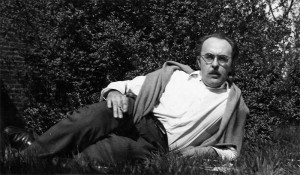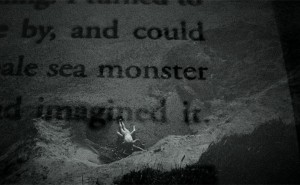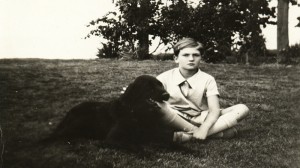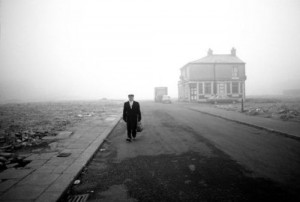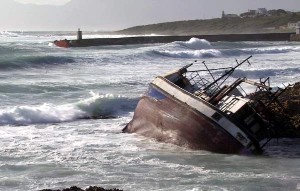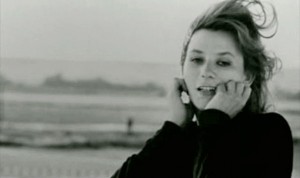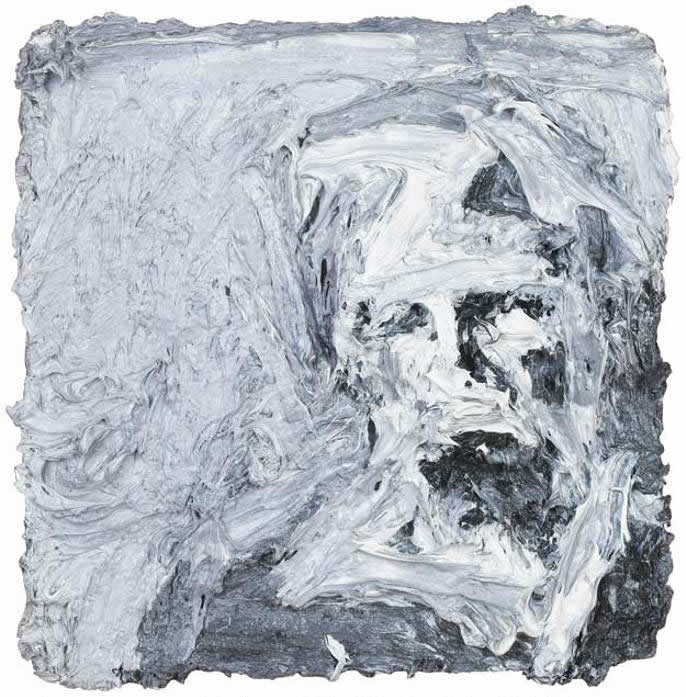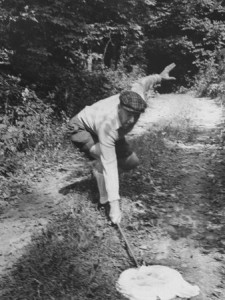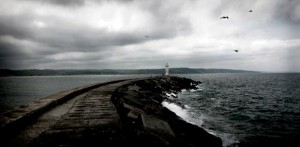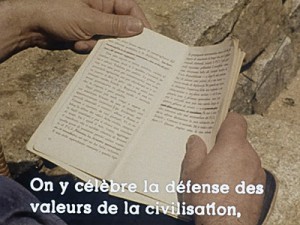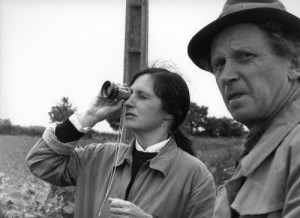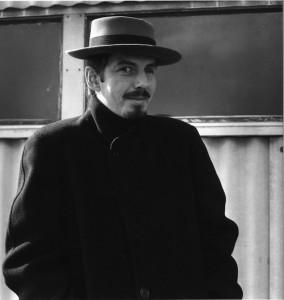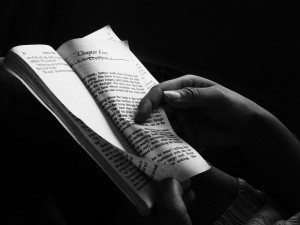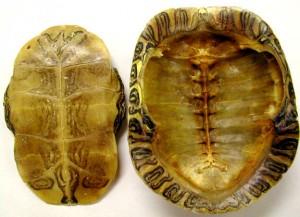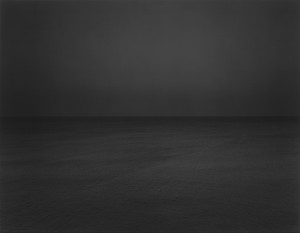Cinema is an invention without a future. (LL)
to underline that when he says “reformist,” he means it as a slur, but at the same time turns it around on itself; sometimes the most despicable and loathsome adversary provides rescue for the castaway. (The old man was always sure that the survivors of the Hood were picked up by a German U-boat, but his memory failed him on that one.) Or if
. . . in this critical ocean. (HMa)
but you have to be able to read them, have to be prepared to offer yourself to the reading, and to do the work. Maybe sometimes (as you’ve said before) the reading is better than the film. My point would be that certainly the reading could be better or as good (or it could be worse, much worse), could itself be “available for decipherment,” could contain more than what was put into it, could be part of a (structurally) interminable chain of cultural objects, ultimately “Culture” itself. And we could say, ultimately “Mourning” itself, since (as I never tire of saying) an apt way to define culture is to say that it is precisely what exists to ensure that the dead are mourned. Part of my response to the film is mournful, that it is what it is and not otherwise, and never will be. Since it is what it is and not what it could’ve been, not any part of that infinite array of potential, but merely this, it stands in the place of the cadaver, under the sign of irrevocable, intractable loss. One has, then, the option of contending with its trace, which may well include its unfulfilled
They were silent, as the dead usually are in our dreams. (WGS)
trying to think back to the time in question. And it “remained a riddle to him, despite his most strenuous thinking about it.” There is no way to go back, to think back, to the time in question: a lesson, maybe, for the dead who return searching for life, and for the living who, feeling that they belong to an earlier world, are preparing to drown in it. Max (Max F and/or Max S?) tries to displace himself into the past of that encounter, chasing after the man who forever chases, he finds himself applying paint thickly, and then repeatedly scratching it off, covering the floor with an encrusted deposit of droppings mixed with coaldust, thick
One knows the hammer by hammering. (MH)
and when I got it I was a bit astonished, I have to say. I mean, who actually “writes a letter” these days? But apparently we can count on you doing your part to maintain the continuity of tradition, a pursuit to which I add my own small contribution with my sharpening mania in the cellar. Strop till you drop I say! Not quite there yet, but soon I’ll have the old 4 1/2 producing shavings under a thou. (Remember the call to the mincer from down in the try pots in “The Cassock” chapter? “Bible leaves! Bible leaves!”) But enough about the ongoing refinement of my erotic life. You asked whether I was writing any
So many true things // which are not truth itself. (SHa)
obscure film likely unseen by most who’ll read the piece; unavailable on DVD in North America, not apt to appear anytime soon at a theater near you, and about as different from PL as, say, La Sortie de l’Usine Lumière à Lyon is from The Enigma of Kaspar Hauser. Not sure if you saw it; I think that when
The wonderful future he dreamt of that summer collapsed without a sound like the proverbial house of cards. All his prospects blurred. For the first time, he experienced that insuperable sense of defeat that was so often to beset him in later times and which, finally, he could not shake off. (WGS)
has something on that order too, though I’d need a metaphor other than “dogged” to identify it: one more “energetic” maybe. He’s also got verbal, poetic and intellectual capabilities that others lack; it occurred to me that some of his writing is like Creeley in the 50s, in the letters to Olson: fast-breaking semi-coded riffs with time-delayed explosive capacity; strings of little astronuggets that reading constellates into thoughtworlds. Perhaps I’m just making this up. I sometimes wonder whether anyone
He stands at a border of whiteness. Facing away from us. Blind to the color of our sail. (AC)
did everything in my power to avoid for as long as possible actually writing, or at least finishing it. It’s about (or it’s supposed to be about, shall we say) a film by Hoo
The names of all fine authors are fictitious ones. (HMb)
the film several times, a particular quotation kept popping into my head: a recondite eruption from the old dissertation days back in the theory shack in Bufftown, when we were supremely disciplined, strict Althusserian Leninists if you recall. Ah, Youth! For whatever reason, I became resolute in the desire to structure the piece around the armature of that quote, and this has been the real bane of the effort to finish, since said structuring required relentless deformation, distortion, distraction (in the etymological sense) of PL, but tough tits: I must (mustn’t I?) always stick to my guns, however ill-conceived or prone to (textual) viol
And I saw her for the last time when, awakened from my Deauville dream, I went to the window of my hotel room. Morning was breaking. The beach still merged colourless into the sea, the sea into the sky. And there she was, in the pale but glowing light of daybreak, on the deserted Promenade des Planches. (WGS)
because I’d seen (again) that Patience film, which led me to reread The Emigrants), the mighty Sebald, like his ubiquitous butterfly man, popped out of the bloody ground and into
Yet this same placid Ocean, as civil now as a city’s harbor, a place for ships and commerce, will erelong be lashed into a sudden fury, and all its caves and cliffs will resound with tumult. . . . This gentle ocean will toss and tear the rag of a man’s body like the father of mad bulls, and his relatives may be seeking the remnants for weeks along the strand. (HDT)
or rather an effect at once overwhelming, oceanic but at the same time cadaverizing, making death present; silence; jabbering
You can tell the genius by what he steals. That he steals. By his flights of fancy. An idiot thief: he should have flown on his own, robbed himself, had he known. Instead of going to take his self from another, risk everything in a rickety calculation, be just a montage about to collapse. (HCa)
and largely hardened at the center near his canvas “and thinning out toward the outer edges, in places resembling the flow of lava.” He had long felt it be of the utmost importance that “nothing should change at his place of work . . . and that nothing further should be added but the debris generated by painting and the dust that continuously fell and which, as he was coming to realize, he loved more than anything else in the world.” The scene of inscription, of artistic production construed as the production of dust, debris, lava which falls or flows from the “continual wiping away of that which is drawn,” “when the matter, little by little, dissolves into nothing,” or very little. Almost nothing. So art doesn’t recapture a lost object, it’s not in search of temps perdu, it’s neither testimony nor recovered memory. Not only. Not simply. Nor does it
We evoke men of the sea, brave navigators, frightened and also enchanted, mastering the most dangerous unknown (that marine infinitude which both buoys and engulfs), by observing a regular movement, a first legality. Everything comes from the sea for men of the sea, just as everything comes from the sky for others, who recognize a given cluster of stars and who designate, in the magic “configuration” of these points of light, the nascent rhythm which already governs their entire language and which they speak (write) before naming it. (MB)
that PL begins with a section called “Writing” only underlines this feature and suggests, at least to me, that Hoolboom (that is, the one I’m calling Hoolboom, the one whose name is on the film), along with Robert Bresson and that Cree guy (“Here are two pens. Write a film about me!”) in that film Phil Hoffman made up north (whose title I have apparently lagoonized), believes precisely in “cinematography,” and in PL he practices his faith. But he can’t do it without complication, without displacement. He can’t do it without irony. Esma from Amsterdam: “The words don’t come from me. They come from other books, conversations with friends . . . I arrange them, that’s all.” She later demonstrates this: “Every wound gives off its own light, and some of these wounds are words.”(Anne Carson) She goes on to describe her project (“I’m going to tell you six stories . . .”) and concludes: “They will constitute my work as a young writer.” (Cf. Steve Reinke’s aim “to complete 100 videos by the year 2000 and my 36th birthday. These will constitute my work as a young artist.” Reinke (his unmistakable voice) immediately turns up
Write! Write! (KH)
a letter to Straub and Huillet written at the time he agreed to take part, Fortini takes note of the ways in which they had, in their previous films, complicated the relations between pre-text (Böll, Brecht, Schoenberg, etc.) and the eventual filmic text. He adds: “It is therefore clear that the character in the film of I cani del Sinai [Fortini reading his book] is not exactly the author of that little book nor yet the “I” who am writing to you now.” And further: “I understand that your warning to me not to trust you meant that there was to be no visible complicity between you and me-as-character or even (in spite of everything) the literalness of my words in Cani. Perhaps you won’t treat me with the critical distance you used in the letter [from Shoenberg] to Kandinsky [in Introduction to Arnold Shoenberg’s “Accompaniment to a Cinematographic Scene”]; but a critical distance there will be, and thanks to that I too shall be carried a stage forward.” Not sure what he means by that last bit, but not a bad initial articulation of the problematics of authorship and enunciation, n’est-ce pas? In addition to the many lengthy
In the illusory babels of language, an artist might advance specifically to get lost, and to intoxicate himself in dizzying syntaxes, seeking odd intersections of meaning, strange corridors of history, unexpected echoes, unknown humors, or voids of knowledge . . . but this quest is risky, full of bottomless fictions and endless architectures and counter-architectures . . . at the end, if there is an end, are perhaps only meaningless reverberations. (RS)
where I wanted to imagine that he thought himself to be striding across the deck of his first ship (which was the battlecruiser HMS Hood, on which he served while she was under repair in Gibraltar; a few months later she made her way to Portsmouth (where he was unaccountably transferred to the Fleet Air Arm), before steaming north to Scapa Flow, and on to her fate in the Denmark Strait, from which only three of about 1400 souls escaped alone to tell thee), or bounding down the beach into a magnificent surf at sunset, rather than
There is too much self in my writing. (AC)
Fortini reading I cani del Sinai onscreen and in voiceover, F-C also offers images of a variety of texts to be read by the viewer: the cover and pages from Fortini’s book; hand-written notes by Fortini; newspaper passages, including a substantial one with a chart; various inscriptions on historical plaques and memorials. There is an excerpt from a televised news broadcast concerning the outbreak of war between Egypt and Israel in June 1967, a woman and a man who comment briefly on that situation, a portion of a service in a synagogue with a rabbi chanting (from the book of Numbers, IV, 1-20: check that out when you get a chance). The rest of the visual material of this heavily verbal, textual film is comprised of shots of unidentified
Memory is fundamentally nothing but a citation. (WGS)
Her name is Marine. Simple as that.
. . . but that docility, as I was already beginning to suspect, was in fact due simply to your great-uncle’s longing for an extinction as total and irreversible as possible of his capacity to think and remember. (WGS)
would agree that flints and rough diamonds may be subversive because they are insoluble in the ubiquitous wash of sentimental drivel and heroic propaganda and Erinnerungslosigkeit, but are they likely to generate any sparks, much less ignite anything in the general gormless slurry of “I want, therefore I
Infinite alterity is quite simply what there is. Any experience at all is the infinite deployment of infinite differences. Even the apparently reflexive experience of myself is by no means the intuition of a unity but a labyrinth of differentiations, and Rimbaud was certainly not wrong when he said: “I am another.” There are as many differences, say, between a Chinese peasant and a young Norwegian professional as between myself and anybody at all, including myself. (AB)
the one who has achieved the widest field of view, perhaps because he’s taken the most risk, because his act of refusal is the most uncompromising. Still I think
The fabulous shadow only the sea keeps. (HCb)
is obviously functionally linked to Straub/Huillet, as a fellow author/artist, but his status (as he suggests in the letter) is utterly fraught, over-determined, constrained, deformed, distracted (in the etymological sense), disastered even, putting entirely into question the point of enunciation from which Fortini’s words, not to mention the film itself, emerge. As is, wouldn’t you say, the authorial status of S/H. (And doesn’t this put into question the film’s enouncé, all the moyles and moyles of it, as well?) Likewise in the Ferber section of The Emigrants, the painter is a stand-in for the author, his tormented “lagoon of oblivion” also Sebald’s, complicating any facile notion of authorial voice. By the way, what gets translated as “oblivion” is, in Sebald’s German original Erinnerungslosigkeit, which I prefer to render as “remembrancelessness,” maybe out of sheer perversity (or maybe I just like big Germanic-sounding words: remember my “orphanhoodedness” riff in the Disasterologies “performance piece” at J’s first Lacan conference? The besplattered giant of Ljubljana could hardly get a word in Hochkantstauchdruck.) But remembrancelessness suggests
. . . Rita Hayworth on a jetty in a nuit américaine of blue-filtered daylight. What was once a film in a movie theatre, then a fragment of broadcast television, is now a kernel of psychical representations, a fleeting association of discrete elements: a voice full of urgency; the passive indifference of painted-palms; a woman waving across the unbridgeable gap that separates the real jetty where she stands from the studio set where a man pretends to leave. The more the film is distanced in memory, the more the binding effect of narrative is loosened. The sequence breaks apart. The fragments go adrift and enter into new combinations, more or less transitory, in the eddies of memory: memories of other films, and memories of real events. (VB)
seems so familiar to me (albeit darkly so) that I am sure (but not utterly sure and there’s no way from this vantage to be utterly sure) that it’s been lifted, more or less holus-bolus, from somewhere amongst The 100 Videos. Of course, I could be wrong. I could even be wrong knowingly. But I do feel sure.) So she arranges them, that’s all, and nothing wrong with that I guess; wasn’t it your hero Walter Benjamin’s dream to author (or should we say compose?) a work consisting entirely of citations? But the entire passage is a bit more stunning: “I arrange them, that’s all. That’s all a writer can ever do.” You either let this pass over you in your benign indifference, or you’re charmed by the ingenuousness of the naive young writer, or (I suppose it’s possible) you blithely agree and wait for the next maxim. Or else you bang your head against a door because it’s pointless to scream “How can you say that?! You’re a writer? Have you never heard of Emily Dickinson?! Clarice Lispector?! Anne Carson?! (Right, you have heard of her.) And yes, yes, you can take the argument to the level of the signifier and beyond; there are only so many words, so many phonemes, so many minimal pairs; there’s a structural limit at the level of linguistic materiality, etc., etc. But sure, we
So writing involves some dashing back and forth between that darkening landscape where facticity is strewn and a windowless room cleared of everything I do not know. It is the clearing that takes time. It is the clearing that is a mystery. (AC)
to apply the metaphor of the semipermeable membrane (film), separating images from things, to language (the primordial act of naming), (re)establishes the “near field” effects of osmotic pressure or quantum tunneling. There is, in language, a thin but constant traffic with the real; song is the resolvent cancellation of the skin, the heart’s passage through the throat. Distant points on the world line may be neighbors in phase space. As close as the two sides of a letter, or a computer scree
My prose pieces are, to my mind, nothing more nor less than parts of a long, plotless, realistic story. For me, the sketches I produce now and then are shortish or longish chapters of a novel. The novel I am constantly writing is always the same one, and might be described as a variously sliced-up or torn-apart book of myself. (RWa)
when I attempted to remind him a short while back that he had once, maybe a number of years ago, said to me, “Painting is boring.” He didn’t remember saying this, and didn’t believe he had, and if he had (which he certainly hadn’t, he was sure), he may have been speaking “ironically.” I didn’t know why he would’ve done that, in that particular context, and said so, to which he replied that it was something that he did. Sometimes, I suppose. On occasion. Naturally, this doesn’t prove anything, although I’m inclined to believe in the ironic possibility. Because the (relatively) little but quite a bit more than nothing I know about him as a person, and the (relatively) more but nowhere near everything I know of him as an artist, brings me to the point of (maybe slightly incomplete) certainty that he could not possibly actually believe that painting is boring. Unless
Not everything that is irrational can be dismissed as stupidity. (EB)
language is necessity, and thus a necessary constraint, but within it immeasurable infinities of singular and multiple possibilities, multiple and singular modes of textual production, singular “voices” or ensembles of voices available to be animated and made concretely actual by manifold acts of (and resistances to) volition on the parts of those who can’t avoid being writers, and even (at times) those who can. An ocean of singularities, and singular multiplicities, and multiple singularities, and sheer multiples, submerged, buoyed up, foundered, cruising deviously, engulfed, swallowed by whales or bobbing along on top of Queequeg’s coffin or clinging to the carcass of a lost torpedo plane. No doubt the process of “arranging” adduced by Esma would account for a certain range within these infinities, but to universalize it, to make it the Ultima Thule of writing, is just
He says something, and then come moments when he is outright happy as a child, and then of course the girl makes a rather severe, punitive face, just to show him a little how very strangely he does fool around with his life. The girl is a Kleist and has enjoyed an education, exactly what her brother has wanted to throw overboard. At heart she is naturally glad that he is feeling better. On and on, well well, what a journey it is. But finally one has to let it go, this stagecoach, and last of all one can permit oneself the observation that on the front of the villa where Kleist lived there hangs a marble plaque which indicates who lived and worked there. Travelers who intend to tour the Alps can read it, the children of Thun read it and spell it out, letter by letter, and then look questioning into each other’s eyes. A Jew can read it, a Christian too, if he has the time and if his train is not leaving that very instant, a Turk, a swallow, insofar as she is interested, I also, I can read it again if I like. Thun stands at the entrance to the Bernese Oberland and is visited every year by thousands of foreigners. I know the region a little perhaps, because I worked as a clerk in a brewery there. The region is considerably more beautiful than I have been able to describe here, the lake is twice as blue, the sky three times as beautiful. Thun had a trade fair, I cannot say exactly but I think four years ago. (RWb)
when you say that it’s “not that writing (or painting) is inherently self-centered and therefore leads to dead ends — that’s not the deeper problem. One’s attitude periodically becomes fearful and self-centered, and the pathology of that is felt in everything you touch. Writing becomes an intolerable mirror of attitude at times, but I think it’s wrong to place blame on words.” OK yes, I think this is true, but “fearful and self-centered” may be an appropriate response to the power of ubiquitous unavoidable exploitation. One of our myths is that the way the world sucks us dry is an invention of our paranoid imaginations, a failure of generosity or openness, an unwillingness to offer ourselves up to the pyr katharsion of social existence. Bullshit, I say. The structures we create to manufacture “value” are clearly exploitative, and their chief business is to fill all available blanks and silences with words and images (or icons even) designed to solicit our constant and undivided enthusiasm for this or that “public” cause. I don’t blame this on words, but I don’t
Of him who ate the book and the mystery within it, one can, in effect, ask the question: Is he good, or is he bad? That question now seems unimportant. The important thing is not knowing whether man is good or bad in the beginning; the important thing is what will transpire once the book has been eaten. (JL)
believed to have been an intense cordite fire surging through the engineroom ventilators, leading to the explosion in the magazine that obliterated the after part of the ship. One of the survivors, Ted Briggs I think, said that the sea was boiling next to the hull as it went
From the sinking whalebrow / I read you– / you recognize me, // heaven / hurls itself / into the harpoon (PC)
disposed in a singular way on the body of each singular subject, and it is around these residual pockets of enjoyment that the drives emerge. “The Trieb,” says Lacan, “implies in itself the advent of the signifier.” And what does the angel say? “Thou must prophesy.” It’s a maxim, a duty. You must speak to peoples, nations, tongues and kings the truth that resides bitter in your belly, even though that speech from the belly comes from other than where you take yourself to be, and even though you may not know what you are saying. At this point I might as well
Where you are where I would be / half thought thought otherwise / Loveless and sleepless the sea (SHb)
dealing as it does with alienation, the disposition of the drives upon the body, tattooing, the question of interpretation, and separation; the separation from place of origin as unsettledness (the unsettled science of cetology, landlessness as the residence of highest truth) and the question of settling of accounts (narrative, capitalist); and finally, servitude, the condition of work in the capitalist machine on land or at sea, the problem of the slavish shore, and of course, slavery itself. I want to stress that this condition of “orphanhoodedness” (that’s what I’m calling it) is always and everywhere predicated on some primordial (and likely immemorial) loss (of derivation, of origin, of place, or freedom) and so we want to know: what is the experience of this loss, how is it experienced, what is the relation of the subject to loss and the lost object? And so on. Provisionally, let’s say that loss involves the subject in a point of trauma, that loss engages the affects of guilt and grief and the process of mourning, and that both the trauma and the lost object are encrypted (“vaulted,” we could say, since we’re doing etymology), secret, hidden (and this is where the “hoodedness” comes in, about which I can say more later; for now, keep in mind what you already know about the etymology of whale, and note that through the Latin cognates for vault, vaulting, rolling etc., we are led to the word “vulva.”) To put asunder, to separate
A place of distress, shipwrecked. (MD)
not only oblivion, amnesia, but also the absence of memorials, a lack of re-collection, or of rituals of grief or mourning, or their attendant markers; perhaps even a failure to properly honor the past, tradition, the hidden and secret lore, the lost, the dead, even to the point of submersion in or engulfment by this failure: a sublime “lagooning” perhaps? Max’s work (and of course he’s called Max, the name Sebald was called by family and friends, and nowadays, now that he’s gone, by fans), these failed portraits like the one of the butterfly man, which he only starts after countless preliminary studies, which he overlays innumerable times, which he subjects to continual scratching-off and reapplication of paint only to wind up with a faceless portrait of a face no longer recalled and no longer
The longer I studied the photographs, the more urgently I sensed a growing need to learn more about the lives of the people in them. (WGS)
unable to bring myself to believe that Hoolboom (the one I’m calling Hoolboom) could possibly be of the party that would send the FBI to Sturges’ studio, seize his work and equipment, and bind him over as a “child pornographer” any more than I can imagine him so blithely
Man looking into the sea, / taking the view from those who have as much right to it as you have to it yourself, / it is human nature to stand in the middle of a thing, / but you cannot stand in the middle of this; (MM)
has no clothes, if indeed he hasn’t. Having looked at it so many times by then, I saw that it was all over the place, as if he has no idea what to do, and then at the end, had to finish it in an impossible situation. Maybe he waited too long: clearly, at the point he finished it he was over it, or as over it as anybody gets, which on second thought may not be much. (The sadistic side of my thing (not deliberate, oh no, I assure you) is that it wants to make him see how much more devastated he could be, how he could continue to be so, etc.) There’s also the problem of deliberately making a piece which mourns, rather than one which, in spite of or beside itself, exhibits the mournful, is an instance of mourning regardless of the specificity of its subject; to do this you need a kind of meta-language (or meta-cinema); a mournful discourse about mourning itself. He’s not an intellectual, not the guy to come up with this on purpose. He’s the guy in the back seat with the heavy camera and a gifted
Whereas ego countersigns liminal existence, “I,” the anonymous, the spider’s lieutenant, signs it. With an X, a mandibular mark. Signs or, rather, signals existence: the gash signals that I was here, within the experience of crude and null existence. Inevitable deferral of writing with respect to the experience of the monster. Dread is voiceless, deaf. That’s why it cannot lie. (JFL)
belligerent and abusive, so the head injury he sustained was more or less a coup de grâce. I gave the authorization for the termination of life-support, and for the post-mortem sectioning of his brain for research. I didn’t for a moment think he’d stepped into the road on purpose; or rather, I didn’t think he’d purposely stepped into that road. Meddings said his old man, who also had it, constantly imagined (I really doubt that’s the right word; these things must be far from flights of fancy) that he was in the POW camp in Italy where he spent a couple of years prior to the Allied invasion and the fall of Mussolini. He’d even start talking in broken Italian, desperately
On page 248 in The Rings of Saturn, W G Sebald is recounting his interviews with one Thomas Abrams, an English farmer who has been working on a model of the temple of Jerusalem – you know, gluing little bits of wood together – for 20 years, including the painstaking research required for historical accuracy. There are ducks on the farm and at one point Abrams says to Sebald, “I have always kept ducks, even as a child, and the colors of their plumage, in particular the dark green and the snow white, seem to be the only possible answer to the questions that are on my mind.” It is an odd thing to say, but Sebald’s book is a long walk of oddities. I did not remember this passage in particular until later the same day when I was reading the dictionary, where I came upon the meaning of the word speculum: 1) an instrument inserted into a body passage for inspection; 2) an ancient mirror; 3) a medieval compendium of all knowledge; 4) a drawing showing the relative position of all the planets; and 5) a patch of color on the secondary wings of most ducks and some other birds. Did Sebald know that a compendium of all knowledge and the ducks’ plumage were one and the same? Did Abrams? Or was I the only one for whom the duck passage made perfect, original sense? I sat in my chair, shocked. I am not a scholar, but for the imaginative reader there can be discoveries, connections between books, that explode the day and one’s heart and the long years that have led to the moment. (MR)
she remembered that Barthes is supposed to have said once to Philippe Sollers: “Whenever you give somebody something to read, you are giving it to your mother.” I began wondering if that applies to putting a film out there. (What RB meant by “giving it to” notwithstanding: a student of mine once said in class, as a refutation of the Oedipus complex, “You oughta see my mother!”) Anyway, I don’t know if this fragmentary morass makes any sense to you, but the fact is that the film had now profoundly changed. Now at last I had a way to answer people who mistakenly thought it was a film about Susan. Including Susan. I had to shoot
And so they are ever returning to us, the dead. At times they come back from the ice more than seven decades later and are found at the edge of the moraine, a few polished bones and a pair of hobnailed boots. (WGS)
because let’s face it, apart from everything else, there is a real girl who’s been photographed, who is depicted in the photograph, and her name is not Amy. Her name is Marine. What is spoken by the actor portraying Amy, this discourse that the shadowy MH adduces and comments on in the interview, does not belong to Marine. But it is given to her, it speaks for her, it commits (or apparently commits) the indignity of speaking for others; it inscribes Marine within a rather tarnished, shopworn, practically bankrupt line of aesthetic-political argument, rather lacking in intellect or vitality in its presentation in the interview or in PL itself, more or less reduced to a tawdry heap of codewords and slogans; designed (so it would seem) to arouse the viewer’s sympathy for the girl as having been violated in some way, tragically so, or so the actor’s portrayal seems meant to convey; and designed as well to arouse the ire of the viewer toward the photographer who is responsible for this violation (and whose unfortunate name, which “Amy” gleefully mocks, might as well be Dick or Cock or PHALLUS). But is this really
I would be a falcon and go free. / I tread her wrist and wear the hood, / talking to myself, and would draw blood. (RD)
massive proliferation of artist “avatars” commences: Esma, obviously; Steve Reinke’s voice and the Reinke-esque (to my mind) discourse and imagery give rise to the specter of the world’s greatest video artist haunting PL; Philip Glass and Madonna; the “amnesiac” filmmaker; the silent photographer; and in the “Amy” section we see Amy (the actor portraying Amy) with a movie camera, but more important is the despised photographer, Jock. In addition, we can salvage from the depths of the familiar (though sometimes murky) “apparatus” fringing the fringe cinema (filmmaker Q & As after screenings, artist statements, interviews, festival blurbs, descriptions of works in various distribution catalogs, panel participation at conferences, etc.), a shadowy “MH” who is prone (not always, but often enough that it can’t help seeming deliberate, an instance of “performance” hors-textuelle) to making truly outrageous statements about what is going on in PL, much to the delight of the eager
Si je désire une eau d’Europe, c’est la flache / Noire et froide où vers le crépuscule embaumé / Un enfant accroupi plein de tristesses, lâche / Un bateau frêle comme un papillon de mai. (AR)
not to say that once something’s written, once it’s inscribed, there’s an absolute guarantee of permanence or continuity, or that any final arrest has been brought to bear on the proverbial “sliding signifier.” (“Stealing” and “flying” are the same word in French (voler), and when little French girls play Cinderella, they dress up in slippers made of squirrel fur, which in heraldic French is vair, homonymical with verre, glass. Or so I’m told.) And of course Plato, in the Seventh Letter and also somewhere else, writes (without irony, I suppose) “Writing is poison to thought.” (Does he use the word pharmakon for poison? If so, I guess I should reconsider about the irony.)
He clearly found it impossible to use his voice, and so responded to what I said only at lengthy intervals, in an attempt at speech that sounded like the rustle of dry leaves in the wind. Still, it was plain enough that he felt his condition was something to be ashamed of and had resolved to put it behind him as soon as possible, one way or another. (WGS)
to say at least that Hoolboom (the one who is called Hoolboom) wears everywhere and always (and in all of his various personae) a mighty carapace of irony (to borrow Anne Carson’s nicely wrought image; and please, do not mistake irony for some light and flimsy simple thing) which secures the multiple deployment, dispersion, dissolution and reconstitution of authorship, of textual authority, of points of enunciation which mark his style in PL and many other works. It also underwrites his policy of appropriating, of admitting, the infinite archive of images, sounds and words ascribed to authorships outside (but only presumably outside) his (presumable) own. It one key, at least, by which he and we together might be carried a stage
Nothing distinguishes memories from other moments: it is only later that they make themselves recognized, by their scars. (CM)
in the Fairey Swordfish (or the “String Bag,” as he used to call it), which was exceedingly slow and thus vulnerable to fighter escorts, and was often sent out well beyond its range so that once they’d dropped their sole torpedo, the crew wound up having to ditch on the way back when they ran out of fuel. Not that many were ever picked up. But luckily for him, he spent almost his entire 6 years in the skies over Portsmouth, training younger fishfodder to operate the puny Vickers machine guns (“Fucking bloody pea-shooters,” as he put it). His rank on demob was Air Gunner/Telegrapher, Fleet Air Arm, which had about the same status as an Army Corporal. Guess that explains his blinkin’ son. Or maybe
If the word revolution had not been made almost ridiculous through abuse, one would have to say that revolutionary action today has to be even more reformist than the reformist; apparently myopic, dedicated to small but sure operations, to making diamonds or deadly artificial flints, to minute sabotage, to patient but total destruction. To attract the occasional bark or the occasional bite is a matter truly of no importance, with no merit or demerit. It is necessary to wish something very different, and above all to believe, with Lenin, that for every situation there exists one way out and the possibility of finding it. Or in other words that truth exists, absolute in its relativity. (FF)
is what she would’ve said; and do thank her for the Two-tailed Pasha specimens and the fine photos of Ardéchois scenery. Looking forward to seeing you both there in June (Skelley has decreed that we should be en France for my 60th, to celebrate with rillets de porc and those two magnums of Cornas I know you’ve got secreted in the root cellar), and if possible getting to one of those plages naturistes on the coast. My camera
This he considered one of his most unsatisfactory works, because in his view it conveyed not even the remotest impression of the strangeness of the apparition it referred to. (WGS)
Sources
AB – Alain Badiou, Ethics
AC – Anne Carson, Economy of the Unlost
AR – Arthur Rimbaud, Le Bateau Ivre
CM – Chris Maker, La Jetée
EB – Ernst Bloch, Heritage of Our Times
FF – Franco Fortini, I Cani del Sinai (and Straub & Huillet, Fortini-Cani)
HCa – Hélène Cixous, “Elpenor’s Dream”
HCb – Hart Crane, “At Melville’s Tomb”
HDT – Henry David Thoreau, Cape Cod
HMa – Herman Melville, Moby-Dick
HMb – Herman Melville, “Hawthorne and His Mosses”
JFL – Jean-François Lyotard, Soundproof Room
KH – The Enigma of Kaspar Hauser (Werner Herzog)
MB – Maurice Blanchot, The Writing of the Disaster
MD – Marguerite Duras, The Lover
MH – Martin Heidegger, Being and Time
MM – Marianne Moore, “The Grave”
MR – Mary Ruefle, “Someone reading a book is a sign of order in the world”
PC – Paul Celan, “From the sinking whalebrow”
RD – Robert Duncan, “My Mother Would Be A Falconress”
RS – Robert Smithson, “A Museum of Language in The Vicinity of Art”
RWa – Robert Walser, “Eine Art Erzählung”
RWb – Robert Walser, “Kleist in Thun”
SHa – Susan Howe, “Thorow”
SHb – Susan Howe, “Silence Wager Stories”
VB – Victor Burgin, The Remembered Film
WGS – W G Sebald, The Emigrants

